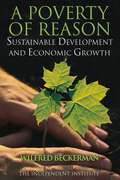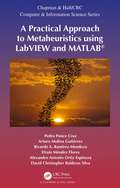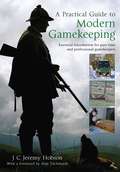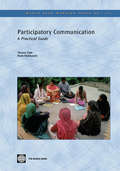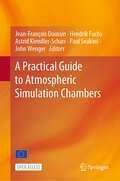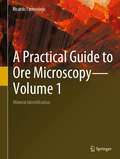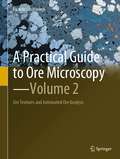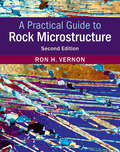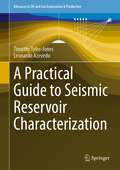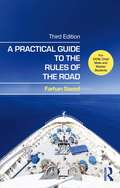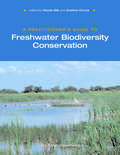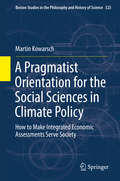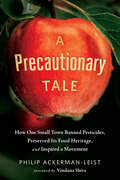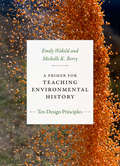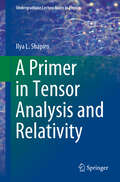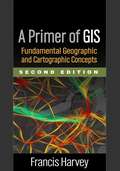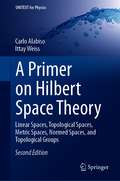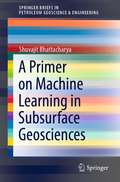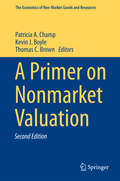- Table View
- List View
A Poverty of Reason: Sustainable Development and Economic Growth
by Wilfred BeckermanEnvironmental activists, politicians and celebrities have touted the wisdom of "sustainable development" as though its meaning and value were clear. But the concept has barely been defined, let alone subjected to scientific, economic, and philosophical scrutiny.Oxford University economist Wilfred Beckerman puts "sustainable development" to the test, questioning several of its core claims: Will economic growth burn itself out by depleting the natural resources it requires? Will global warming wreak widespread havoc? Does human activity threaten to throw a delicate planet dangerously "out of balance"? Do future generations possess rights that morally override the claims of those alive today? At what price? After examining the evidence, Beckerman finds "sustainable development" lacking on both scientific and moral grounds. Although millions of people lack clean air and water, and are plagued by deteriorating ecosystems, these problems are caused not by "unsustainable development" but by poverty, poorly defined property rights, and lack of freedom of opportunity. And, Beckerman concludes, because "sustainable development" recommends policies that would worsen these conditions (for present and future generations), it hardly occupies the moral high ground, as its supporters claim. A Poverty of Reason provides a critical examination of this highly controversial topic and will prove essential in the ongoing debate about environmental and economic practices.
A Practical Approach to Metaheuristics using LabVIEW and MATLAB® (Chapman & Hall/CRC Computer and Information Science Series)
by Pedro Ponce-Cruz Arturo Molina Gutiérrez Ricardo A. Ramírez-Mendoza Efraín Méndez Flores Alexandro Antonio Espinoza David Christopher SilvaMetaheuristic optimization has become a prime alternative for solving complex optimization problems in several areas. Hence, practitioners and researchers have been paying extensive attention to those metaheuristic algorithms that are mainly based on natural phenomena. However, when those algorithms are implemented, there are not enough books that deal with theoretical and experimental problems in a friendly manner so this book presents a novel structure that includes a complete description of the most important metaheuristic optimization algorithms as well as a new proposal of a new metaheuristic optimization named earthquake optimization. This book also has several practical exercises and a toolbox for MATLAB® and a toolkit for LabVIEW are integrated as complementary material for this book. These toolkits allow readers to move from a simulation environment to an experimentation one very fast. This book is suitable for researchers, students, and professionals in several areas, such as economics, architecture, computer science, electrical engineering, and control systems. The unique features of this book are as follows: Developed for researchers, undergraduate and graduate students, and practitioners A friendly description of the main metaheuristic optimization algorithms Theoretical and practical optimization examples A new earthquake optimization algorithm Updated state-of-the-art and research optimization projects The authors are multidisciplinary/interdisciplinary lecturers and researchers who have written a structure-friendly learning methodology to understand each metaheuristic optimization algorithm presented in this book.
A Practical Guide To Modern Gamekeeping: Essential Information For Part-time And Professional Gamekeepers
by Alan Titchmarsh J.C. Jeremy HobsonThis book is a comprehensive gamekeeping manual for those enthusiastic amateurs who spend their spare time running a small DIY syndicate shoot, and for those who are professionally employed on a full-time basis. <P><P>It shows the reader how to perform all the tasks required of the modern gamekeeper, including how to rear and release game and advises on many aspects of habitat improvement and conservation. It also covers important and sometimes controversial issues, such as public access on private land, the need for predator and pest control, and many other aspects which need to be considered by keepers, be they part-time or professional. You'll discover important information about: The gamekeeper's calendar - Rearing and releasing methods - Safe and sensible use of veterinary medicines - Legislation and the law - Health & safety requirements - How to become a qualified keeper and the training needed. <P>Bang up to date, this book also incorporates fascinating and interesting snippets and pictures from the past in order to show how this most traditional of countryside occupations has evolved.
A Practical Guide To Modern Gamekeeping: Essential information for part-time and professional gamekeepers
by J.C. Jeremy HobsonThis book is a comprehensive gamekeeping manual for those enthusiastic amateurs who spend their spare time running a small DIY syndicate shoot, and for those who are professionally employed on a full-time basis. It shows the reader how to perform all the tasks required of the modern gamekeeper, including how to rear and release game and advises on many aspects of habitat improvement and conservation. It also covers important and sometimes controversial issues, such as public access on private land, the need for predator and pest control, and many other aspects which need to be considered by keepers, be they part-time or professional. You'll discover important information about: - The gamekeeper's calendar - Rearing and releasing methods - Safe and sensible use of veterinary medicines - Legislation and the law - Health & safety requirements - How to become a qualified keeper and the training needed. Bang up to date, this book also incorporates fascinating and interesting snippets and pictures from the past in order to show how this most traditional of countryside occupations has evolved. 'Jeremy Hobson does much in this book to apprise us all of the modern approach to keepering, from raising birds and habitat management to choosing coats and boots and training dogs. It is all here, and a fascinating read it is - both for those in the know and those who are curious to learn all about it.' Alan Titchmarsh, patron of the National Gamekeeper's Organisation
A Practical Guide in Participatory Communication
by Paolo Mefalopulos Thomas TufteWhat do we mean when we say participatory communication? What are the practical implications of working with participatory communication strategies in development and social change processes? What experiences exists in practice that documents that participatory communication adds value to a development project or programme? The aim of this user guide on participatory communication is to provide answers to some of these questions. Many communication practitioners and development workers face obstacles and challenges in their practical work. A participatory communication strategy offers a very specific perspective on how to articulate social processes, decision-making processes and any change process for that matter. Participatory approaches are nothing new. However, what is new is the proliferation of institutions, especially governmental but also non-governmental, that seek participatory approaches in their development initiative. This guide seeks to provide perspectives, tools and experiences regarding how to go about it with participatory communication strategies. It is conceived as a guide that hopefully can be of relevance and utility for development workers in the field. It is targeted at both at government and their officials, World Bank staff and at civil society.
A Practical Guide to Atmospheric Simulation Chambers
by Jean-François Doussin Hendrik Fuchs Astrid Kiendler-Scharr Paul Seakins John WengerThis open access title presents atmospheric simulation chambers as effective tools for atmospheric chemistry research. State-of-the-art simulation chambers provide unprecedented opportunities for atmospheric scientists to perform experiments that address the most important questions in air quality and climate research. The book covers technical details about chamber preparation and practical guidelines on their usage, while also delivering relevant historical and contextual information. It not only serves as a key publication for knowledge transfer within the simulation chamber research community, but it also provides the global atmospheric science community with a unique resource that outlines best practice for the operation of simulation chambers. The authors summarize the latest advances in chamber interoperability and standard protocols in order to provide the research community and the next generations of scientists with a unique technical reference guide for the use of simulation chambers. The volume will be of great interest to researchers and graduates working in the fields of Atmospheric and Environmental Sciences.
A Practical Guide to Ore Microscopy—Volume 1: Mineral Identification
by Ricardo CastroviejoThis book offers a guide to the microscopic study of metallic ores with reflected light. It combines a rigorous approach with an attractive and easy-to-follow format, using high-quality calibrated photomicrographs to illustrate the use of color for ore identification. The ore identification methodology is updated with systematic color analysis and the application of new multispectral reflectance datasets, which offer an efficient tool for automated ore characterization. In addition, the first volume of this two-part work discusses the essential gangue minerals.Readers will gain familiarity with the method as they follow its application to over 200 selected minerals, comprising the most important ore (≈150) and gangue (≈50) minerals, which are described in the text. Each entry includes an explanatory text with corresponding color photomicrographs for each of the most common microscope settings, preceded by a table summarizing the ore’s main properties, and followed by spectral information in the visible and near-infrared ranges (specular reflectance values from 370 to 1000 nm). Some uncommon, strategic ores, e.g. columbotantalite (“coltan”) and monazite, receive particular attention or are described for the first time with reflected light.Lastly, the book presents a learning strategy for beginners and students. The approach is essentially practical, focusing on the development of observation skills, including self-checking through proposed practical tasks. In addition, the traditional use of determinative tables is critically reviewed and updated.This book is part of a two-volume work. The second volume focuses on intergrowths/textural analysis and interpretation, as well as computer-vision-based automation and applications to ore processing/geometallurgy.The intended audience includes professionals and engineers dealing with mineral resources, as well as postgraduate students. The book also provides lifelong learning support for freelancers and a valuable reference resource for practical university teaching.
A Practical Guide to Ore Microscopy—Volume 2: Ore Textures and Automated Ore Analysis
by Ricardo CastroviejoThis book presents recent developments in ore microscopy to support the work of engineers and scientists actively engaged in the field of mineral raw materials (processing plant engineers in mines, process mineralogists and chemists, exploration geologists, etc.) or in ore deposit research. Textural analysis must be rigorous, and simple to be practical. With this aim, the author proposes a specific and user-friendly systematic for textural analysis. A high-performance tool to acquire, quantify, and process the data applied for automated ore characterization is key to predict ore behavior, a fundamental aim of geometallurgy. The recently developed AMCO System (Automated Microscopic Characterization of Ores) provides the tool, first prototype available using computer vision coupled with reflected light microscopy. This innovation is introduced in the text and discussed through case studies of actual mining problems.This second volume of the book "A Practical Guide to Ore Microscopy" includes references, indexes, and other relevant information, plus Annexes 1 to 5. The latter include ore and gangue mineral indexes and mineral abbreviations (Annex 1), a brief compendium of common mineral associations in the main ore deposit types (Annex 2), an introduction to the procedures and techniques used to prepare polished sections (Annex 3), and the various tables used to identify common ores by direct microscopic observation (Annexes 4 and 5).
A Practical Guide to Rock Microstructure
by Ron H. VernonUnderstanding the physical relationships of minerals and rocks is essential to interpreting detailed chemical and isotopic mineral analyses. Covering the basic processes behind various rock microstructures, Ron Vernon uses high-quality color illustrations to point out complications of interpretation, emphasize pitfalls, and disclose the latest techniques and approaches. He includes a comprehensive reference list that will be useful for advanced students wishing to delve more deeply.
A Practical Guide to Rock Microstructure
by Ron H. VernonA clear understanding of the processes responsible for observed rock microstructures is essential for making reliable petrogenetic interpretations, including inferences made from chemical and isotopic analyses of minerals. This volume presents a comprehensive survey of rock microstructures, emphasising basic concepts and the latest methods, while highlighting potential pitfalls in the interpretation of the origin of rock microstructure. Richly illustrated with over 250 colour photographs, including more than 10 percent new photomicrographs and several mesoscopic images, it demonstrates the basic processes responsible for the wide variety of microstructures in igneous, metamorphic and sedimentary rocks. This second edition includes extensive updates to the coverage of igneous rocks as well as recent ideas on physical processes in migmatites and partial melting of sedimentary rocks. This practical guide will continue to be an invaluable resource to advanced students and early-career researchers of mineralogy, petrology and structural geology, as well as professional geologists and material scientists.
A Practical Guide to Seismic Reservoir Characterization (Advances in Oil and Gas Exploration & Production)
by Leonardo Azevedo Timothy Tylor-JonesThis book covers in detail the entire workflow for quantitative seismic interpretation of subsurface modeling and characterization. It focusses on each step of the geo-modeling workflow starting from data preconditioning and wavelet extraction, which is the basis for the reservoir geophysics described and introduced in the following chapters. This book allows the reader to get a comprehensive insight of the most common and advanced workflows. It aims at graduate students related to energy (hydrocarbons), CO2 geological storage, and near surface characterization as well as professionals in these industries. The reader benefits from the strong and coherent theoretical background of the book, which is accompanied with real case examples.
A Practical Guide to the Rules of the Road: For OOW, Chief Mate and Master Students
by Farhan SaeedA self-teaching aid that covers International regulations for preventing collision at sea 1972 (Colregs) or Rules of the Road, including navigation lights and related situations that could be asked within the Maritime and Coastguard Agency oral examinations for the deck certificate of competency. This book is divided into two sections. The first section contains simple explanations of the Rules of the Road, while the second section covers more than sixty situations, exam questions and model answers. Interactive navigation light identification software is also available on a companion website to offer further testing before examination. All questions are asked randomly, and will help prepare you for the oral exam. Self-teaching guide to the International regulations for preventing collision at sea 1972 (Colregs) / Maritime Coastguard Agency (MCA) Rules of the Road oral examinations Scenarios, questions and model answers help you prepare for the examination Interactive navigation light identification software on a companion website allows students to test themselves before entering exams. Visit the website at www.seamanshiptutor.com.
A Practitioner's Guide to Freshwater Biodiversity Conservation
by Kristine Ciruna Nicole SilkA Practitioner's Guide to Freshwater Biodiversity Conservation brings together knowledge and experience from conservation practitioners and experts around the world to help readers understand the global challenge of conserving biodiversity in freshwater ecosystems. More importantly, it offers specific strategies and suggestions for managers to use in establishing new conservation initiatives or improving the effectiveness of existing initiatives. The book: offers an understanding of fundamental issues by explaining how ecosystems are structured and how they support biodiversity; provides specific information and approaches for identifying areas most in need of protection; examines promising strategies that can help reduce biodiversity loss; and describes design considerations and methods for measuring success within an adaptive management framework. The book draws on experience and knowledge gained during a five-year project of The Nature Conservancy known as the Freshwater Initiative, which brought together a range of practitioners to create a learning laboratory for testing ideas, approaches, tools, strategies, and methods. For professionals involved with land or water management-including state and federal agency staff, scientists and researchers working with conservation organizations, students and faculty involved with freshwater issues or biodiversity conservation, and policymakers concerned with environmental issues-the book represents an important new source of information, ideas, and approaches.
A Pragmatist Orientation for the Social Sciences in Climate Policy: How to Make Integrated Economic Assessments Serve Society (Boston Studies in the Philosophy and History of Science #323)
by Martin KowarschThis book develops a new science-policy model for the Intergovernmental Panel on Climate Change (IPCC) and other socio-economic assessments of climate policy options. The work presented in this volume is systematically based on John Dewey's philosophy and inevitable fact/value entanglement in economics, and this work adds to current debates on science in policy. The model developed here could also promote deliberative democracy as an alternative to value dogmatism or procedural liberalism. The "Pragmatic Enlightened Model" presented here shows that experts should, in a participatory process, map the entire solution space by exploring alternative political pathways and their manifold practical consequences. This would allow a rational consideration even of controversial, value-laden policy goals through a comparative evaluation of their consequences, potentially requiring a revision of said values or goals. This book provides orientation for both assessment practitioners and their critical observers. Policymakers, stakeholders and public officials in the field of climate policy will find this work of interest, as will scholars from various disciplines, especially economics. Furthermore, researchers working on deliberative democracy, philosophy of economics, pragmatist meta-ethics, models of PPA (public policy analysis), STS (science and technology studies) with a focus on scientific policy advice, RIA (regulatory impact assessment), as well as the history of global environmental assessments, will find this work particularly valuable.
A Prairie Boy's Winter
by William KurelekText and twenty color paintings depict the rigors and simple pleasures during the stark 1930s.
A Precautionary Tale: How One Small Town Banned Pesticides, Preserved Its Food Heritage, and Inspired a Movement
by Philip Ackerman-LeistMals, Italy, has long been known as the breadbasket of the Tyrol. But recently the tiny town became known for something else entirely. A Precautionary Tale tells us why, introducing readers to an unlikely group of activists and a forward-thinking mayor who came together to ban pesticides in Mals by a referendum vote—making it the first place on Earth to accomplish such a feat, and a model for other towns and regions to follow.For hundreds of years, the people of Mals had cherished their traditional foodways and kept their local agriculture organic. Their town had become a mecca for tourists drawn by the alpine landscape, the rural and historic character of the villages, and the fine breads, wines, cheeses, herbs, vegetables, and the other traditional foods they produced. Yet Mals is located high up in the eastern Alps, and the valley below was being steadily overtaken by big apple producers, heavily dependent on pesticides. As Big Apple crept further and further up the region&’s mountainsides, their toxic spray drifted with the valley&’s ever-present winds and began to fall on the farms and fields of Mals—threatening their organic certifications, as well as their health and that of their livestock. The advancing threats gradually motivated a diverse cast of characters to take action—each in their own unique way, and then in concert in an iconic display of direct democracy in action. As Ackerman-Leist recounts their uprising, we meet an organic dairy farmer who decides to speak up when his hay is poisoned by drift; a pediatrician who engaged other medical professionals to protect the soil, water, and air that the health of her patients depends upon; a hairdresser whose salon conversations mobilized the town&’s women in an extraordinarily conceived campaign; and others who together orchestrated one of the rare revolutionary successes of our time and inspired a movement now snaking its way through Europe and the United States.A foreword by Vandana Shiva calls upon others to follow in Mals&’s footsteps.
A Primer On String Theory
by Volker SchomerusSince its conception in the 1960s, string theory has been hailed as one of the most promising routes we have to unify quantum mechanics and general relativity. This book provides a concise introduction to string theory explaining central concepts, mathematical tools and covering recent developments in physics including compactifications and gauge/string dualities. With string theory being a multidisciplinary field interfacing with high energy physics, mathematics and quantum field theory, this book is ideal for both students with no previous knowledge of the field and scholars from other disciplines who are looking for an introduction to basic concepts.
A Primer for Teaching Environmental History: Ten Design Principles (Design Principles for Teaching History)
by Emily Wakild Michelle K. BerryA Primer for Teaching Environmental History is a guide for college and high school teachers who are teaching environmental history for the first time, for experienced teachers who want to reinvigorate their courses, for those who are training future teachers to prepare their own syllabi, and for teachers who want to incorporate environmental history into their world history courses. Emily Wakild and Michelle K. Berry offer design principles for creating syllabi that will help students navigate a wide range of topics, from food, environmental justice, and natural resources to animal-human relations, senses of place, and climate change. In their discussions of learning objectives, assessment, project-based learning, using technology, and syllabus design, Wakild and Berry draw readers into the process of strategically designing courses on environmental history that will challenge students to think critically about one of the most urgent topics of study in the twenty-first century.
A Primer in Tensor Analysis and Relativity (Undergraduate Lecture Notes in Physics)
by Ilya L. ShapiroThis undergraduate textbook provides a simple, concise introduction to tensor algebra and analysis, as well as special and general relativity. With a plethora of examples, explanations, and exercises, it forms a well-rounded didactic text that will be useful for any related course.The book is divided into three main parts, all based on lecture notes that have been refined for classroom teaching over the past two decades. Part I provides students with a comprehensive overview of tensors. Part II links the very introductory first part and the relatively advanced third part, demonstrating the important intermediate-level applications of tensor analysis. Part III contains an extended discussion of general relativity, and includes material useful for students interested primarily in quantum field theory and quantum gravity.Tailored to the undergraduate, this textbook offers explanations of technical material not easily found or detailed elsewhere, including an understandable description of Riemann normal coordinates and conformal transformations. Future theoretical and experimental physicists, as well as mathematicians, will thus find it a wonderful first read on the subject.
A Primer of Conservation Genetics
by Richard Frankham Jonathan D. Ballou David A. Briscoe Karina H. Mcinnes Richard Frankham Jonathan D. Ballou David A. BriscoeIntended for those with a limited background in genetic studies, this concise, entry-level text in conservation genetics is presented in a user-friendly format, with main points clearly highlighted. Solved problems are provided throughout to help illustrate key equations, although a basic knowledge of Mendelian genetics and simple statistics is assumed. A glossary and suggestions for further reading provide additional support for the reader. Numerous pen-and-ink portraits of endangered species bring the material to life. Also available: Introduction to Conservation Genetics ". . . balance[s] student need for clarity and brevity with the requirements of conservation professionals for detailed applications. <P> Advisory: Bookshare has learned that this book offers only partial accessibility. We have kept it in the collection because it is useful for some of our members. To explore further access options with us, please contact us through the Book Quality link on the right sidebar. Benetech is actively working on projects to improve accessibility issues such as these.
A Primer of GIS, Second Edition
by Francis HarveyThis accessible text prepares students to understand and work with geographic information systems (GIS), offering a detailed introduction to essential theories, concepts, and skills. The book is organized in four modular parts that can be used in any sequence in entry-level and more specialized courses. Basic cartographic principles are integrated with up-to-date discussions of GIS technologies and applications. Coverage includes everything from what geographic information is to its many uses and societal implications. Practical examples and exercises invite readers to explore the choices involved in producing reliable maps and other forms of geographic information. Illustrations include 170 figures (with 15 in color). The companion website provides links to Web resources for each chapter, plus downloadable PowerPoint slides of most of the figures. New to This Edition *Chapter on online mapping and Big Data. *New and updated discussions of remote sensing, vector and raster data models, location privacy, uses of geocoding, and other timely topics. *Chapter on the many uses of GIS, such as in market analyses, emergency responding, and tracking of epidemics. *Section overviews and an end-of-book glossary. Pedagogical Features *Modules and individual chapters can be used sequentially or in any order. *End-of-chapter review questions with answers, exercises, and extended exercises for applying theories and concepts. *"In-Depth" sidebars offering a closer look at key concepts and applications. *End-of-chapter links to relevant Web resources.
A Primer on Fourier Analysis for the Geosciences
by Robin CrockettTime-series analysis is used to identify and quantify periodic features in datasets and has many applications across the geosciences, from analysing weather data, to solid-Earth geophysical modelling. This intuitive introduction provides a practical 'how-to' guide to basic Fourier theory, with a particular focus on Earth system applications. The book starts with a discussion of statistical correlation, before introducing Fourier series and building to the fast Fourier transform (FFT) and related periodogram techniques. The theory is illustrated with numerous worked examples using R datasets, from Milankovitch orbital-forcing cycles to tidal harmonics and exoplanet orbital periods. These examples highlight the key concepts and encourage readers to investigate more advanced time-series techniques. The book concludes with a consideration of statistical effect size and significance. This useful book is ideal for graduate students and researchers in the Earth system sciences who are looking for an accessible introduction to time-series analysis.
A Primer on Hilbert Space Theory: Linear Spaces, Topological Spaces, Metric Spaces, Normed Spaces, and Topological Groups (UNITEXT for Physics)
by Carlo Alabiso Ittay WeissThis book offers an essential introduction to the theory of Hilbert space, a fundamental tool for non-relativistic quantum mechanics. Linear, topological, metric, and normed spaces are all addressed in detail, in a rigorous but reader-friendly fashion. The rationale for providing an introduction to the theory of Hilbert space, rather than a detailed study of Hilbert space theory itself, lies in the strenuous mathematics demands that even the simplest physical cases entail. Graduate courses in physics rarely offer enough time to cover the theory of Hilbert space and operators, as well as distribution theory, with sufficient mathematical rigor. Accordingly, compromises must be found between full rigor and the practical use of the instruments. Based on one of the authors’s lectures on functional analysis for graduate students in physics, the book will equip readers to approach Hilbert space and, subsequently, rigged Hilbert space, with a more practical attitude. It also includes a brief introduction to topological groups, and to other mathematical structures akin to Hilbert space. Exercises and solved problems accompany the main text, offering readers opportunities to deepen their understanding. The topics and their presentation have been chosen with the goal of quickly, yet rigorously and effectively, preparing readers for the intricacies of Hilbert space. Consequently, some topics, e.g., the Lebesgue integral, are treated in a somewhat unorthodox manner. The book is ideally suited for use in upper undergraduate and lower graduate courses, both in Physics and in Mathematics.
A Primer on Machine Learning in Subsurface Geosciences (SpringerBriefs in Petroleum Geoscience & Engineering)
by Shuvajit BhattacharyaThis book provides readers with a timely review and discussion of the success, promise, and perils of machine learning in geosciences. It explores the fundamentals of data science and machine learning, and how their advances have disrupted the traditional workflows used in the industry and academia, including geology, geophysics, petrophysics, geomechanics, and geochemistry. It then presents the real-world applications and explains that, while this disruption has affected the top-level executives, geoscientists as well as field operators in the industry and academia, machine learning will ultimately benefit these users. The book is written by a practitioner of machine learning and statistics, keeping geoscientists in mind. It highlights the need to go beyond concepts covered in STAT 101 courses and embrace new computational tools to solve complex problems in geosciences. It also offers practitioners, researchers, and academics insights into how to identify, develop, deploy, and recommend fit-for-purpose machine learning models to solve real-world problems in subsurface geosciences.
A Primer on Nonmarket Valuation (The Economics of Non-Market Goods and Resources #13)
by Thomas C. Brown Patricia A. Champ Kevin J. BoyleThis is a practical book with clear descriptions of the most commonly used nonmarket methods. The first chapters of the book provide the context and theoretical foundation of nonmarket valuation along with a discussion of data collection procedures. The middle chapters describe the major stated- and revealed-preference valuation methods. For each method, the steps involved in implementation are laid out and carefully explained with supporting references from the published literature. The final chapters of the book examine the relevance of experimentation to economic valuation, the transfer of existing nonmarket values to new settings, and assessments of the reliability and validity of nonmarket values. The book is relevant to individuals in many professions at all career levels. Professionals in government agencies, attorneys involved with natural resource damage assessments, graduate students, and others will appreciate the thorough descriptions of how to design, implement, and analyze a nonmarket valuation study.
